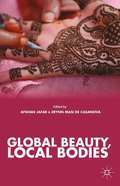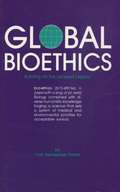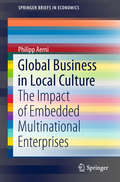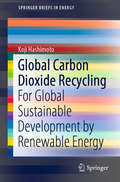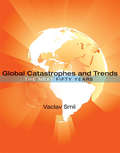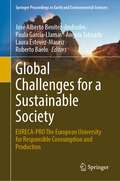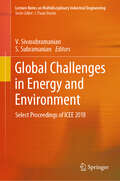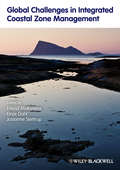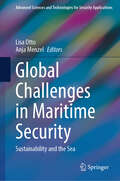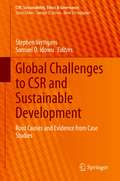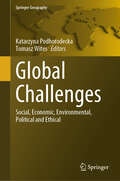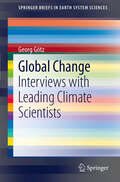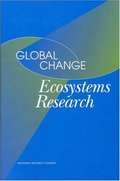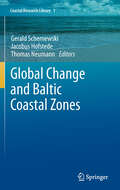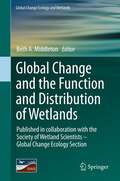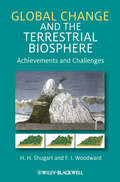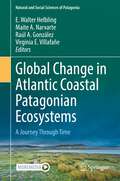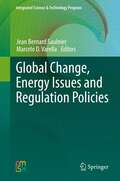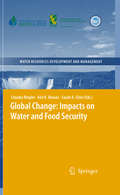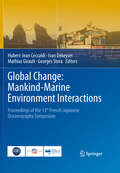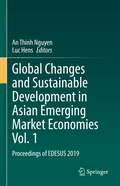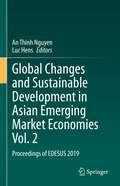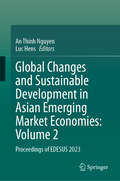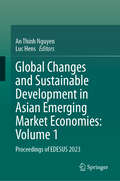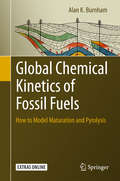- Table View
- List View
Global Beauty, Local Bodies
by Erynn Masi de Casanova Afshan JafarWhat do the words global, transnational, national, and local mean when talking about beauty, which is simultaneously abstract and ephemeral, embodied and concrete? How do ideas and images of beauty circulate in a globalizing world, and how do people's bodily practices respond to them? Rather than simply examining how beauty is thought about and aspired to in international settings, this collection of original scholarly work and first-person accounts takes globalization processes and the transnational links these processes create as the jumping-off point for an examination of what it means to be, have, or aspire to a beautiful body.
Global Bioethics: Building on the Leopold Legacy
by Van Rensselaer PotterThis book on Bioethics discusses regarding the Leopold legacy, human survival, dilemmas in ecological Bioethics, two kinds of bioethics, dilemmas in medical bioethics, the control of human fertility and global bioethics defined. Appendix includes the Leopold heritage and a bioethical creed for individuals.
Global Business in Local Culture: The Impact Of Embedded Multinational Enterprises (SpringerBriefs in Economics)
by Philipp AerniThis book examines the impact of multinational enterprises (MNEs) on local economies, and presents selected case studies of MNEs operating in low income countries. By balancing external social and environmental costs against its corresponding benefits, the book demonstrates that MNEs can have a positive net-impact on local development if they build up social capital by embedding themselves in local economies and engaging responsibly with local stakeholders. By doing so MNEs contribute to inclusive growth, a cental pillar of the UN Sustainable Development Goals. In this context, the book challenges popular narratives in civil society and academia that frame foreign direct investment (FDI) merely as a threat to human rights and sustainable development. Moreover, it offers practical guidance for globally operating businesses seeking to establish progressive Corporate Social Responsibility (CSR) strategies of their own.
Global Carbon Dioxide Recycling: For Global Sustainable Development by Renewable Energy (SpringerBriefs in Energy)
by Koji HashimotoThis brief describes the current critical situation of global warming and shows its solution by renewable energy use. The author has long studied the development of new materials with chemical functions and is renowned as the first advocate of power-to-gas. He established the technology to convert renewable energy to synthesized natural gas, methane by electrolytic hydrogen generation using surplus electricity from renewable energy, and subsequent methanation of carbon dioxide by reaction with hydrogen.In the first part of this brief, data on global warming and energy consumption are shown and analyzed from the author’s keen point of view. The second part introduces the author’s research results on key materials for global carbon dioxide recycling and constructed pilot plants based on them. Finally, an evidence-based solution to maintain sustainable development by using only renewable energy is described as a future prospect.This book is useful not only for researchers and students studying chemical engineering, materials, or energy, but also for general citizens who are interested in the global environment.
Global Catastrophes and Trends: The Next Fifty Years (The\mit Press Ser.)
by Vaclav SmilA wide-ranging, interdisciplinary look at global changes that may occur over the next fifty years—whether sudden and cataclysmic world-changing events or gradually unfolding trends.Fundamental change occurs most often in one of two ways: as a “fatal discontinuity,” a sudden catastrophic event that is potentially world changing, or as a persistent, gradual trend. Global catastrophes include volcanic eruptions, viral pandemics, wars, and large-scale terrorist attacks; trends are demographic, environmental, economic, and political shifts that unfold over time. In this provocative book, scientist Vaclav Smil takes a wide-ranging, interdisciplinary look at the catastrophes and trends the next fifty years may bring.Smil first looks at rare but cataclysmic events, both natural and human-produced, then at trends of global importance, including the transition from fossil fuels to other energy sources and growing economic and social inequality. He also considers environmental change—in some ways an amalgam of sudden discontinuities and gradual change—and assesses the often misunderstood complexities of global warming.Global Catastrophes and Trends does not come down on the side of either doom-and-gloom scenarios or techno-euphoria. Instead, Smil argues that understanding change will help us reverse negative trends and minimize the risk of catastrophe.
Global Challenges for a Sustainable Society: EURECA-PRO The European University for Responsible Consumption and Production (Springer Proceedings in Earth and Environmental Sciences)
by José Alberto Benítez-Andrades Paula García-Llamas Ángela Taboada Laura Estévez-Mauriz Roberto BaeloEURECA-PRO is the global educational core hub and interdisciplinary research and innovation leader in qualitative environmental and social framework development for responsible consumption and production.Through its novel approach, on the one hand, it holistically contributes to the highly topical issue of Sustainable Consumption and Production under the umbrella of Sustainable Development Goal 12, and on the other hand it effectively contributes to the development of the European Higher Education Area complimentary to Sustainable Development Goal 4.In this book readers will find the discussion results among professionals, academics and scientists on responsible consumption and production, regarding the latest advances to achieve a sustainable society. This book contents 5 chapters focused on: Smart and healthy societies, Recycling, reused and longer lasting products, fresh air, clean water, healthy soil and biodiversity, cleaner energy and cutting-edge clean technological innovation, and industry 4.0.This book also intends to show the current and future challenges, and innovative solutions considering the technological, humanistic, educational, economic, social and environmental dimensions of sustainability
Global Challenges in Energy and Environment: Select Proceedings of ICEE 2018 (Lecture Notes on Multidisciplinary Industrial Engineering)
by S. Subramanian V. SivasubramanianThis book comprises select proceedings of the International Conference on Energy and Environment - Global Challenges (ICEE 2018). The book focuses on applications of green technologies in chemical and biochemical engineering, wastewater treatment, energy and environmental sustainability. It covers current environmental issues such as air pollution and control, solid waste management and wastewater treatment, and suggests potential solutions to tackle them. The contents of this book will be useful to students and researchers working in the field of energy and environmental engineering.
Global Challenges in Integrated Coastal Zone Management
by Einar Dahl Josianne StøttrupGrowing pressure from increasingly diverse human activities coupled with climate change impacts threaten the functional integrity of coastal ecosystems around the globe. A multi-disciplinary approach towards understanding drivers, pressures and impacts in the coastal zone requires effective integration of data and information in policy and management, combining expertise from nature and social science, to reach a balanced and sustainable development of the coastal zone. This important book comprises the proceedings of The International Symposium on Integrated Coastal Zone Management, which took place in Arendal, Norway between 3-7 July 2011. The main objective of the Symposium was to present current knowledge and to address issues on advice and management related to the coastal zone. The major themes of papers included in this book are: Coastal habitats and ecosystem services Adaptation/mitigation to change in coastal systems Coastal governance Linking science and management Comprising a huge wealth of information, this timely and well-edited volume is essential reading for all those involved in coastal zone management around the globe. All libraries in research establishments and universities where marine, aquatic and environmental sciences, and fisheries and aquatic sciences are studied and taught will need copies of this important volume on their shelves.
Global Challenges in Maritime Security: Sustainability and the Sea (Advanced Sciences and Technologies for Security Applications)
by Lisa Otto Anja MenzelAchieving sustainability is perhaps the single-most important task for our generation. In the face of a looming climate disaster, calls for the sustainable use of the world’s resources are getting louder. As the sea covers more than 70 per cent of the earth’s surface, this holds even more true for the use of ocean resources. Despite its vastness, the sea has often been a securitised and politicised space, where the concepts of sustainability and security meet at sea in the form of a myriad of important contemporary issues. In this volume, we set out the intersection between sustainability and security alongside the security-development nexus, and examine these issues under four dimensions of security: economic security, ecological security, human security, and traditional security. Within sections dedicated to each of these we explore both theory and practice by offering cases alongside a conceptual discussion, and in so doing cover topics ranging from the Blue Economy and the net-zero agenda, to natural disasters and climate change, from food security and the future of Small Island Developing States, to the geopolitics of the Arctic. This book takes a bird’s eye view, connecting the dots between these issues of security and sustainability, and ending with scenarios for the future with policy-making in mind. This volume presents a timely and compelling argument that policymakers and scholars need to come to terms with the intersection of sustainability and security at sea. The editors detail a clear and insightful conceptual approach for grasping the simultaneity and interplay of security and sustainability concerns that will give inspiration to further research in the field. Chapter contributors convincingly illustrate aspects of this approach across regions, scales and sites of political engagement – from port cities to the UN. A must read for students, researchers and practitioners of ocean politics. Elana Wilson Rowe, Research Professor at the Norwegian Institute of International Affairs (NUPI) “Too often issues of security and sustainability at sea have been studied in narrow terms. This volume makes a critical contribution the literature by unpacking the interconnections and interdependence between these two vitally important issues.” Robert McCabe, Assistant Professor and Director of the MA Maritime Security Programme at Coventry University. "In this timely publication, an international set of contributors portray a rich array of views on the oceans, security and sustainability for the reader. Of particular value is how the security-sustainability nexus runs through the chapters to emphasise the ever-growing importance and relevance of this interplay.” Francois Vreÿ, Professor Emeritus of Military Science and Research Coordinator at the Security Institute for Governance and Leadership in Africa (SIGLA), Stellenbosch University.
Global Challenges to CSR and Sustainable Development: Root Causes and Evidence from Case Studies (CSR, Sustainability, Ethics & Governance)
by Samuel O. Idowu Stephen VertigansThis book examines and analyzes the challenges programmes for Corporate Social Responsibility (CSR) and sustainable development are facing in global management practice. It looks at the dichotomy of a general and popular demand for responsible and resilient management, and the counterplayers that impact the positive effect of such efforts. The book assembles latest research looking at the root causes for this opposition, and new case studies that showcase the dilemma and possible solutions to overcome it. Overall, the book juxtaposes short terminism within CSR programmes and longer term sustainable development, mis-allocation of resources and failed promises associated with CSR, and sketches pathways how CSR and sustainable development can be directed towards the most pressing issues.
Global Challenges: Social, Economic, Environmental, Political and Ethical (Springer Geography)
by Katarzyna Podhorodecka Tomasz WitesThis book addresses some of the most urgent global problems in today's world from a geographical perspective and highlights contemporary environmental, political, economic, social and geoethical aspects. The authors discuss causes, developments and challenges faced on a regional and global scale covering among others environmental issues such as loss of biodiversity, development of tourism, natural hazards and disaster risk reduction, migration issues, the global economic crisis and sustainable development. The presented collection of concepts and examples from specific regions offer a new outlook on globalization issues in the world as a whole. This volume can be used as a guide for students from different faculties who wish to understand global issues in the world from a geographical perspective. This book appeals to scientists and students of geography, economics, geopolitics, sustainability issues as well as policy makers and planners.
Global Change
by Georg GötzSeven interviews with leading climate scientists cover both fundamental research (climate modeling, global warming, sea level change, melting of the ice caps, natural hazards) and impact assessment (adaption, mitigation, economic impacts and costs of climate change). Experts on different aspects of the topic explain their own field and give their opinion on general questions concerning climate change. The goal is to provide the reader with first-hand information on the current state of climate research.
Global Change Ecosystems Research
by Ecosystems PanelThe National Academies Press (NAP)--publisher for the National Academies--publishes more than 200 books a year offering the most authoritative views, definitive information, and groundbreaking recommendations on a wide range of topics in science, engineering, and health. Our books are unique in that they are authored by the nation's leading experts in every scientific field.
Global Change and Baltic Coastal Zones
by Thomas Neumann Gerald Schernewski Jacobus HofstedeClimate change and ongoing transformation processes in economy and agriculture will have strong and multiple impacts in the Baltic region. In particular coastal zones face increasing hazards, e.g. due to sea level rise or changes in riverine nutrient loads and eutrophication. These changes also offer a wide range of new opportunities in the Baltic Region. Adaptation measures are needed but require a thorough and spatially differentiated understanding of underlying ecological, economic and social processes. Sixteen contributions by authors from eight countries give a comprehensive overview of these changes, their consequences and practical challenges with focus on coastal zones. Besides risks, the chances and opportunities of changes for the region are addressed and adaptation examples and strategies are given. The practitioners' perspective and their demands are integrated in the various contributions.
Global Change and the Function and Distribution of Wetlands
by Beth A. MiddletonThe Global Change Ecology and Wetlands book series will highlight the latest research from the world leaders in the field of climate change in wetlands. Global Change and the Function and Distribution of Wetlands highlights information of importance to wetland ecologists. The chapters include syntheses of international studies on the effects of drought on function and regeneration in wetlands, sea level rise and the distribution of mangrove swamps, former distributions of swamp species and future lessons from paleoecology, and shifts in atmospheric emissions across geographical regions in wetlands. Overall, the book will contribute to a better understanding of the potential effects of climate change on world wetland distribution and function.
Global Change and the Terrestrial Biosphere: Achievements and Challenges
by H. H. Shugart F. I. WoodwardGlobal climate change challenges ecologists to synthesize what we know to solve a problem with deep historical roots in our discipline. In ecology, the question, “How do terrestrial ecosystems interact with the other earth systems to produce planetary change?” has sufficient depth to be the focal challenge. This central question is sharpened further as the changes that we may be manifesting upon our planet’s systems of land, sea, air and ice can have potential consequences for the future of human civilization. This book provides the depth of the history of global ecology and reviews the breadth of the ideas being studied today. Each chapter starts with a brief narrative about a scientist whose work traces forward into today’s issues in global ecosystems. The discussions are framed in a growing realization that we may be altering the way our planet functions almost before we have gained the necessary knowledge of how it works at all.
Global Change in Atlantic Coastal Patagonian Ecosystems: A Journey Through Time (Natural and Social Sciences of Patagonia)
by E. Walter Helbling Virginia E. Villafañe Maite A. Narvarte Raúl A. GonzálezThis book provides an integrated view of Atlantic coastal Patagonian ecosystems, including the physical environment, biodiversity and the main ecological processes, together with their derived ecosystem services and anthropogenic impacts. It focuses on the key components of the aquatic ecosystem, covering the lower levels (plankton) to the top predators like large mammals and birds, before turning to human beings as consumers and shapers of coastal marine resources. The book then presents an overview of how organisms that constitute the aquatic food webs have changed through time and how they likely will soon change due to global change processes and anthropogenic pressures. In this regard it offers a wealth of information such as long-term patterns in physical / atmospheric processes, biodiversity and the distribution of marine organisms, as well as the results of experimental studies designed to understand their responses under future scenarios shaped by both climate change and anthropogenic pressures. The book also covers various aspects of the past, present and potential future relationship of human beings with Patagonian coastal environments, including the utilization of sea products, tourism, and growth of cities.
Global Change, Energy Issues and Regulation Policies
by Marcelo D. Varella Jean Bernard SaulnierThis book analyses the deep interaction between the world's environmental crises, energy production, conversion and use, and global regulation policies. Bringing together experts from a wide range of scientific fields, it offers the reader a broad scope of knowledge on such topics as: climate change and exhaustion of resources the relationship between basic science and the development of sustainable energy technologies the relationship between global and local environmental policiesthe possible competition between foodstuff production and that of agro-fuels urban adaptation negotiations at the international level financial rules This book invites the reader to consider the multidisciplinary aspects of these urgent energy/environmental issues.
Global Change: Impacts on Water and food Security
by Asit K. Biswas Sarah Cline Claudia RinglerThis volume examines the various drivers of global change, including climate change, and the use of agricultural knowledge, science, and technology, as well as the outcomes of global change processes, including impacts on water quality and human well-being. Several authors examine potential policy and institutional solutions afforded by globalization to the challenges ahead, particularly the role of trade policy. Financing water development in a more globalized world and adapting to global warming are also examined.
Global Change: Mankind-Marine Environment Interactions
by Hubert-Jean Ceccaldi Georges Stora Ivan Dekeyser Mathias GiraultBased on the material presented at a conference organized by the Centre d'Océanologie of Marseille, held in 2008, this text covers a wealth of hot topics related to the way mankind interacts with the marine environment. With the state of our oceans and seas becoming an increasing source of concern worldwide, this timely addition to the debate features the latest research in both France and Japan. The book's chapters present work on many of the key areas of oceanographic study. The concept of marine biodiversity is treated, in particular how it is affected by human agency and invasive species, many of which have been introduced anthropogenically. Coastal zones are analyzed in detail, with a focus on the interaction between ports and natural environments, and the ecological and economical consequences of this relationship. A chapter on aquaculture looks at ecologically sound management as well as the preservation of resources. New and emerging technologies that aid our observation of the marine environment are covered, as is the physical, chemical, biological and biogeochemical functioning of natural and man-made environments. Featuring work by some of the leading researchers in the field from both France and Japan, this work demonstrates the strength of the links between the two scientific communities, and is an important contribution to the ongoing discussion on the effects of global warming as well as mankind's impact on the marine environment we depend on for so much.
Global Changes and Sustainable Development in Asian Emerging Market Economies Vol. 1: Proceedings of EDESUS 2019
by An Thinh Nguyen Luc HensThis two-volume set presents the conference papers from the 1st International Conference on Economics, Development and Sustainability (EDESUS 2019), organized by the University of Economics and Business, Vietnam National University, Hanoi. The collection addresses global changes and sustainable development in Vietnam and other emerging market economies in Asia, and covers wider topics such as economics and business (e.g. economic theory, national and international income distribution, macroeconomic policies, sectors of economy, productivity developments, financial market, business governance, bank financing), development and sustainability (e.g. developing process, development policy, public policy, sustainable growth, sustainability tools, sustainable livelihood, sustainable tourism, green growth), and resources and global change (e.g. human resources, natural resources, climate change, globalization, global challenges). The books are of interest to professors, researchers, lecturers, and students in economics and geography, consultants, and decision makers interested in global changes and sustainable development. Volume 1 focuses on economic development in Vietnam and other emerging market economies in Asia. This covers topics such as economics and business (e.g. economic theory, national and international income distribution, macroeconomic policies, sectors of economy, productivity developments, financial market, business governance, bank financing) and development studies (e.g. developing process, development policy, public policy, green growth).
Global Changes and Sustainable Development in Asian Emerging Market Economies Vol. 2: Proceedings of EDESUS 2019
by An Thinh Nguyen Luc HensThis two-volume set presents the conference papers from the 1st International Conference on Economics, Development and Sustainability (EDESUS 2019), organized by the University of Economics and Business, Vietnam National University, Hanoi. The collection addresses global changes and sustainable development in Vietnam and other emerging market economies in Asia, and covers wider topics such as economics and business (e.g. economic theory, national and international income distribution, macroeconomic policies, sectors of economy, productivity developments, financial market, business governance, bank financing), development and sustainability (e.g. developing process, development policy, public policy, sustainable growth, sustainability tools, sustainable livelihood, sustainable tourism, green growth), and resources and global change (e.g. human resources, natural resources, climate change, globalization, global challenges). The books are of interest to professors, researchers, lecturers, and students in economics and geography, consultants, and decision makers interested in global changes and sustainable development. Volume 2 focuses on global changes and sustainable development in Vietnam and other emerging market economies in Asia. This covers topics such as sustainability (e.g. sustainable growth, sustainability tools, sustainable livelihood, sustainable tourism), and change in resources globally (e.g. human resources, natural resources, climate change, globalization, global challenges).
Global Changes and Sustainable Development in Asian Emerging Market Economies: Proceedings of EDESUS 2023
by An Thinh Nguyen Luc HensThis two-volume set presents the conference papers from the 2023 iteration of the International Conference on Economics, Development and Sustainability (EDESUS 2023), organized by the VNU University of Economics and Business, Vietnam National University, Hanoi. The collection addresses global changes and sustainable development in Vietnam and other emerging market economies in Asia, and covers wider topics such as economics and business (e.g. economic theory, national and international income distribution, macroeconomic policies, sectors of economy, productivity developments, financial market, business governance, bank financing), development and sustainability (e.g. developing process, development policy, public policy, sustainable growth, sustainability tools, sustainable livelihood, sustainable tourism, green growth), and resources and global change (e.g. human resources, natural resources, climate change, globalization, global challenges). The books are of interest to professors, researchers, lecturers, and students in economics and geography, consultants, and decision makers interested in global changes and sustainable development. Volume 2 focuses on global changes and sustainable development in Vietnam and other emerging market economies in Asia. This covers topics such as sustainability (e.g. sustainable growth, sustainability tools, sustainable livelihood, sustainable tourism), and change in resources globally (e.g. human resources, natural resources, climate change, globalization, global challenges).
Global Changes and Sustainable Development in Asian Emerging Market Economies: Proceedings of EDESUS 2023
by An Thinh Nguyen Luc HensThis two-volume set presents the conference papers from the 2023 iteration of the International Conference on Economics, Development and Sustainability (EDESUS 2023), organized by the VNU University of Economics and Business, Vietnam National University, Hanoi. The collection addresses global changes and sustainable development in Vietnam and other emerging market economies in Asia, and covers wider topics such as economics and business (e.g. economic theory, national and international income distribution, macroeconomic policies, sectors of economy, productivity developments, financial market, business governance, bank financing), development and sustainability (e.g. developing process, development policy, public policy, sustainable growth, sustainability tools, sustainable livelihood, sustainable tourism, green growth), and resources and global change (e.g. human resources, natural resources, climate change, globalization, global challenges). The books are of interest to professors, researchers, lecturers, and students in economics and geography, consultants, and decision makers interested in global changes and sustainable development. Volume 1 focuses on economic development in Vietnam and other emerging market economies in Asia. This covers topics such as economics and business (e.g. economic theory, national and international income distribution, macroeconomic policies, sectors of economy, productivity developments, financial market, business governance, bank financing) and development studies (e.g. developing process, development policy, public policy, green growth).
Global Chemical Kinetics of Fossil Fuels
by Alan K. BurnhamThis book covers the origin and chemical structure of sedimentary organic matter, how that structure relates to appropriate chemical reaction models, how to obtain reaction data uncontaminated by heat and mass transfer, and how to convert that data into global kinetic models that extrapolate over wide temperature ranges. It also shows applications for in-situ and above-ground processing of oil shale, coal and other heavy fossil fuels. It is essential reading for anyone who wants to develop and apply reliable chemical kinetic models for natural petroleum formation and fossil fuel processing and is designed for course use in petroleum systems modelling. Problem sets, examples and case studies are included to aid in teaching and learning. It presents original work and contains an extensive reanalysis of data from the literature.
